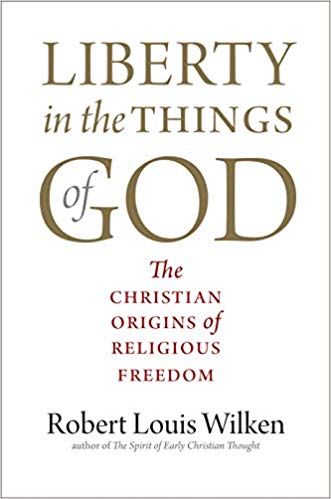Robert Louis Wilken, emeritus professor at the University of Virginia, is one of this generation’s greatest historians of early Christianity. In Liberty in the Things of God: The Christian Origins of Religious Freedom, he delivers a readable, compelling history of the idea of religious liberty, ranging from the church fathers to John Locke. That scope is essential to Wilken’s basic argument, which is that Christians pioneered the idea of religious liberty.
Religious liberty did not begin with the Enlightenment
When Locke advanced the best-known argument for religious liberty (or at least toleration) in Western intellectual history, he was simply restating what Christians had been saying for millennia about the sacred rights of conscience. To Wilken, Locke was hardly an innovator, yet Locke obscured the debt he owed to Christian history for his argument in favor of religious toleration and the rights of conscience. Because of writers such as Locke, historians got the misguided notions that Enlightenment thinkers invented religious liberty, and that the concept was relatively secular in origin.
Instead, to Wilken, the belief in religious liberty was and is deeply Christian. He suggests that religious liberty should retain an honored place among Christians, and that church-state separation should never be used to disadvantage believers or to justify the violation of their consciences.
As seen in passages such as Matthew 22:21 (“render unto Caesar the things that are Caesar’s”), the Bible itself contains resources for understanding the sacred rights of conscience and a certain kind of church-state separation. Wilken turns to early church history, however, to show that believers quickly crafted arguments to validate their worship of Christ alone, and not the pagan gods of the Romans.
The church father Tertullian, Wilken shows, was the first writer in the history of Western civilization “to use the phrase ‘freedom of religion’” (11). The biblical tradition and church fathers did not prevent churches from seeking partnerships with government, however. Constantine and his successors crafted the concept of a Christian society in which churches worked with civil magistrates to preference and sometimes to enforce godly belief and practice. This blending of religion and government was the default mode in the ancient world. It was no surprise that Christians followed the model when they could, even if it led inexorably to the corruption of the church as a tool of state power.
The Reformation and religious liberty
Wilken skips over the medieval period fairly quickly, moving on to the Reformation. The fact that he largely passes over about a thousand years of church history may speak to the paucity of relevant sources in between the church fathers and the Reformation. But it also makes me wonder, if there really was such a deep churchly tradition of religious liberty, why did it show up so infrequently between Constantine and Luther?
In any case, Wilken argues that the circumstances of the Reformation forced the latent tradition of religious liberty into the open among Christian dissenters. These could include Protestant sects, as well as dissenting Catholics, who found themselves as a persecuted minority in places from Nuremberg to London. Reformation-era persecution and dissent were the great drivers of the arguments for religious liberty.
Wilken provides a wonderfully illuminating survey of ideas about church-state separation during the long Reformation. Religious liberty was rarely so simple as just allowing people to worship as their consciences dictated. Some advocates of toleration argued that people could believe what they wanted, but they could not be allowed to exercise that belief, especially in public. Doing so threatened the health and stability of the godly society. Others (including Locke) argued that Protestants might be permitted to worship openly, but not Catholics, because Catholics were ostensibly sworn to obey a foreign power (the pope). Others, such as Rhode Island’s Roger Williams, made a firm distinction between church on one hand, and the moral law of society on the other. The civil government was responsible for the latter, but it should not touch the former, according to Williams.
Baptists and religious liberty
As much as Wilken seems to appreciate the voluntary quality of true faith, Baptists might notice that Wilken does not grapple with the problems inherent in a “parish” view of the church, or the associated issue of infant baptism. Virtually all Christians practiced infant baptism at the dawn of the 17th century. Wilken shows that Christians dating back to Tertullian had argued that true religion was voluntary in nature, and he incidentally notes episodes such as Pope Innocent III’s condemnation of the forced baptism of Jews. “If one has not of his own accord sought baptism, he cannot have faith,” Wilken explains (38). But infant baptism, which had become a fixed practice by the sixth century, inevitably complicated the voluntary ideal.
The parish model and paedobaptism also guaranteed some blending of church and state, at least at the local level. In the parish model, people became Christians (at least by implication) by being born in a Christian town with a Christian church where you were baptized as an infant. Some pietists, Puritans, and other “hot Protestants” started to question that assumption, insisting that being baptized as an infant did not lead to spiritual regeneration. But it was left to the Baptists and continental “Anabaptists” to make baptism and church membership more fully voluntary, and to call for the (sometimes elusive) ideal of a regenerate church membership conditioned on believer’s baptism. To them, this voluntary congregational order entailed a return to the original biblical model.
The English Baptist Thomas Helwys receives pride of place in Wilken’s assessment as arguably the most consistent and forward-thinking advocate of religious liberty. In Wilken’s conclusion, he returns admiringly to Helwys, because of Helwys’s advocacy of religious freedom not just for Baptists or Protestants, but for all Christians, Jews, and Muslims. If the civil magistrate takes any role in enforcing true worship, as Locke would still have had it, liberty must be restricted to the government’s preferred brand(s) of faith. But if the government’s job is just to protect the free exercise of religion, and not to play religious favorites, then liberty of conscience transforms into a gift granted equally to all. That arrangement was the genius of the American constitutional order.










